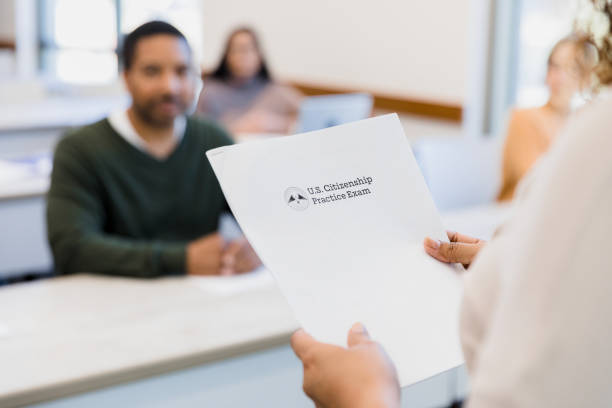Beginning October 20, 2025, a new version of the U.S. citizenship test will take effect, featuring more questions and a higher proportion of written answers. The change marks a shift away from simple memorization toward understanding the historical and constitutional concepts behind each question.
The U.S. Citizenship and Immigration Services (USCIS), which previewed the reform in the Federal Register last month, has now released the full list of 128 updated civics questions on its website. Those filing the N-400 naturalization application on or after October 20 must prepare using the new format.
The revision stems from the Trump administration’s policy to tighten naturalization reviews, which significantly reduced the discretion of USCIS officers. According to Korean applicants who recently took interviews at the USCIS Los Angeles Field Office, officers are already showing a “rule-based” approach to evaluations.
▶ 20 questions asked; 12 required to pass
Under the previous system, applicants studied 100 questions, 10 of which were chosen at random during the interview. Passing required six correct answers. Under the new version, applicants must now study 128 questions, of which 20 will be asked — and 12 must be answered correctly to pass.
The new format also increases the proportion of written, descriptive questions. For instance, applicants may be asked to explain the role of the Constitution, the importance of the Declaration of Independence, the meaning of the rule of law, or the purpose of the 10th Amendment. Such questions test comprehension of historical context rather than memorized responses.
Jeany Choi, Operations & Program Manager at the Korean American Coalition (KAC), said, “The new format requires understanding both the background and consequences, not just memorizing a single answer.” She added that examiners may ask follow-up questions depending on applicants’ responses.
Applicants aged 65 or older who have held permanent residency for 20 years or more will still qualify for a simplified version: studying only 20 marked questions and answering six out of ten correctly to pass.
▶ Stronger evaluation of speaking, reading, and writing
Officers also assess English communication during the interview. USCIS guidelines state that speaking ability is evaluated naturally through conversation. Applicants must correctly read one of three sentences aloud for the reading test and accurately write one dictated sentence for the writing portion.
▶ Greater emphasis on lawful conduct and moral integrity
The Trump administration has placed stronger focus on applicants’ Good Moral Character (GMC), emphasizing lawful behavior and honesty in disclosure. All records of domestic violence, DUI, or other offenses must be listed on the N-400. Applicants with any issues that could affect moral character eligibility should prepare supporting documents and explanations.
Jeany Choi noted that moral character evaluations have become more prominent in recent interviews. She advised applicants to bring documentation for the past five years, including travel records and even minor traffic citation receipts. “During the interview, you need to show that you’ve lived as a law-abiding resident,” she said.
Applicants can access the full list of 128 citizenship questions at www.uscis.gov/citizenship
BY HYOUNGJAE KIM [kim.ian@koreadaily.com]


![U.S. arrivals face hourlong immigration waits at Incheon Airport Incheon International Airport’s Terminal 2 is crowded with arriving passengers on Jan. 30. [Courtesy of reader]](https://www.koreadailyus.com/wp-content/uploads/2026/02/0217-Incheon-100x70.jpg)


